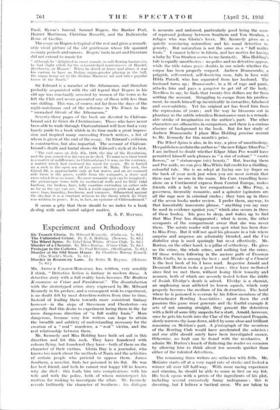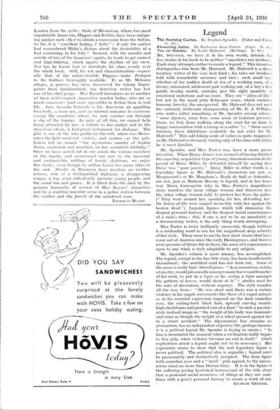Experiment and Orthodoxy
Sic Transit Gloria. By Milward Kennedy. (Gollalcz. 7s. Bd.) The Unfinished Crime. By E. S. Holding. (Newnes. 7s. M.) The Wheel Spins. By Ethel Lina White. (Crime Club. 7s. 6d.) Murder of a Chemist. By Miles Burton. (Crime Club. 7s. 6d.) Prologue to the Gallows. By Paul McGuire. (Sketfington. 78. 6d.) Murder at the Old Stone House. By Charlotte Murray Russell.
(The World's Work. 7s. 6d.)
Murder in Rosemary Lane. By Helen M. Keynes. (Melrose. 7s. Cs1.) Mn. ARTHUR CALDER-MARSHALL has written, very sensibly I think, "Detective fiction is fantasy in modern dress. A
detective story with a full reality basis becomes The Brothers ligrantazov or Crime and Punishment." The dissatisfaction with the stereotyped crime story expressed by Mr. Milward Kennedy in his preface, and a consequent wish to experiment, is no doubt felt by most detection-writers from time to time. Instead of leading them towards more consistent fantasy however—in the steps of Stevenson and Chesterton—we generally find this desire to experiment luring them in the far more dangerous direction of "a full reality basis." More dangerous, because very few writers can hope to attain
the breadth and subtlety of understanding necessary for the creation of a " real " murderer, a " real " victim, and the real relationship between them.
Mr. Kennedy and Miss Holding have both set sail in this direction and hit this rock. They have foundered with colours flying, but foundered they have—both of them on the character of their victims. Gloria Day is a journalist, who knows too much about the methods of Nazis and the activities of certain people who pretend to oppose them. James Southern, a novelist, finds her poisoned in his flat. He was her best friend, and feels he cannot rest happy till he knows why she died : this leads him into complications with his wife and with the police, both of whom misinterpret his motives for wishing to investigate the affair. Mr. Kennedy reveals brilliantly the character of Southern : his dialogue
is accurate and unforced, particularly good being the scene of repressed jealousy between Southern and Von Steuben, a refugee who was Gloria's lover. Mr. Kennedy gives us a quietly convincing naturalism and his usual detective in- genuity. But naturalism is not the same as a "full reality basis." I cannot believe in Gloria, and her motive for having a baby by Von Steuben seems to me fantastic. Miss Holding's tale is equally unorthodox : no police and no detective appear, while the title raises grave doubts in our minds whether the corpse has been properly corpSed. Andrew Branscombe, a priggish, self-centred, self-deceiving man, falls in love with Hilda Patrell, who has separated from her husband. The husband turns up ; Branscombe, in a fit of rage and panic, attacks him and pays a gangster to get rid of the body. Needless to say, he finds that twenty-five dollars are far from settling the account. Struggling to escape from his predica- ment, he-snarls himself up inextricably in cowardice, falsehood and over-subtlety. Yet his original act has freed him from the repressions of years ; and the way he blossoms out in phantasy as the subtle relentless Renaissance man is a remark- able stroke of imagination on the author's part The other characters are silhouettes in comparison, and there is a curious absence of background to the book. But for her study of Andrew Branscombe I place Miss Holding progeinte accessil to Mr. Kennedy for this month's prize.
The Wheel Spins is also, in its way, a piece of unorthodoxy. Her publishers acclaim the author as" the new Edgar Allan Poe." I am inclined to doubt whether Edgar Allan Poe would have permitted himself such phrases as "a riot of colour," "exotic flowers," or " staturesque (sic) beauty." But, leaving them and Poe aside, we can give Miss White full credit for a thrilling, colourful tale. She is an adept at laying one icy finger on the back of your neck just when you are most certain that there can be no one in the room. Iris Carr, travelling home alone on a Continental express from Central Europe, makes friends with a lady in her compartment—a Miss Froy, a governess, incurably romantic, and a spinster (spinsters are all the rage now in criminal circles ; they turn up in three of the seven books under review. I prefer them, anyway, to that lamentably inaccurate phrase, "anything you say may be used in evidence against you," which also occurs in three of these books). Iris goes to sleep, and wakes up to find that Miss Froy has disappeared : what is more, the other occupants of the compartment swear that she was never there. The astute reader will soon spot what has been done to Miss Froy. But it will not spoil his pleasure in a tale where surprise and suspense are admirably blended, and the Fox diabolica stop is used sparingly but most effectively. Mr. Burton, on the other hand, is a pillar of orthodoxy. He gives us the crime, the whole crime, and nothing but the crime. Of those writers following in the austere path of Freeman Wills Crofts, he is among the best ; and Murder of a Chemist is the- hest book of his I have read. Inspector Arnold and Desmond Merrion make a good team: they have mellowed since first we met them, without losing their tenacity and acumen, both of which are severely tested before the riddle of Josiah Elvidge's death is solved. Elvidge is a chemist, an unpleasing man addicted to lemon squash, which very properly becomes the medium of his destruction. The hotel Where he is poisoned is overrun by his fellow-members of the Downehester Bowling Association ; apart from the evil passions this game must generate and the fearful example it sets of not running straight, they present the detectives with a field of some fifty suspects for a start. Arnold, however, once he gets his teeth into the Clue of the Punctured Penguin, slowly narrows the issue down, aided by some close and brilliant reasoning on Merrion's part. A photograph of the members of the Bowling Club would have accelerated the solution : and one alibi should surely have been investigated sooner. Otherwise, no fault can be found with the mechanics. I admire Mr. Burton's knack of flattering the reader on occasion by allowing him to think about ten seconds quicker than either of the talented detectives.
The remaining three writers are orthodox with frills. Mr. McGuire starts off at a very rapid rate of stroke and looked a winner all over till half-way. With more racing experience and stamina, he should be able to come in first on my list. His book opens with a précis of the ingredients of his plot,- including several excessively funny radiograms : this is diverting, but I believe -a lactidal- error. We' -are taken to London from the nntiv.1 State of .Micornicop, where, twq Anost unpalatable financiers, Hippax and Kolitis, have been intrigu- - ing against each ctlyar to obtain a concession from the Sultan. So far, it is "excellent fooling, i' faith" : if only the author . bad remembered Blake's dictum about the desirability of:a fool continuing in his folly ! Instead, with the murder and
• suicide of two of the financiers' agents, he tends to get earnest and high-faluting, which upsets the rhythm of his crew. Nor has he learnt how to distribute his clues evenly over the whole book. Still, his wit and characterisation—especi- ally that of the enfant-terrible Hippax—make Prologue to the Gallows thoroughly readable. If, as Mr. McGuire alleges, a process has been discovered for taking finger- '. prints from handkerchiefs, the detection writer has lost • one of his chief props. Miss Russell introduces us to another • of these acid-tongued, inquisitive maiden ladies, who arc so !much commoner (and more agreeable) in fiction than in real life. Jane Amanda Edwards is fat, American, an appalling busybody, a born spy, and an infernal nuisance to everyone except the murderer, whom Ale only catches out through a slip of the tongue. In spite . of all this, we cannot help being attracted by her—a tribute to her author and to the American idiom, a fool-proof instrument for dialogue. The plot is one of the who-profits-by-the-will, where-was-Moses- when-the-light-went-out variety, and centres—as the pub- • lishers tell us—round "the mysterious murder of Sophia
• Stone, matriarch and martinet, on her seventieth birthday." Once we have sorted out in our minds the various members of the family, and accustomed our ears to the incessant and castanet-like rattling of family skeletons, we enjoy this book ; even though its author leaves too many clues -to the end. Murder in Rosemary Lane involves an ex-film- actress, wife of a distinguished diplomat, a disappearing corpse, a fog, some ridiculously quixotic young people, and the usual fun and games. It is lifted from the ruck by the genuine humanity of several of Miss Keynes' characters . and by a startling macabre scene in a police station between
• the mother and the fiancée of the murdered man.
NICHOLAS BLAKE.



















































 Previous page
Previous page